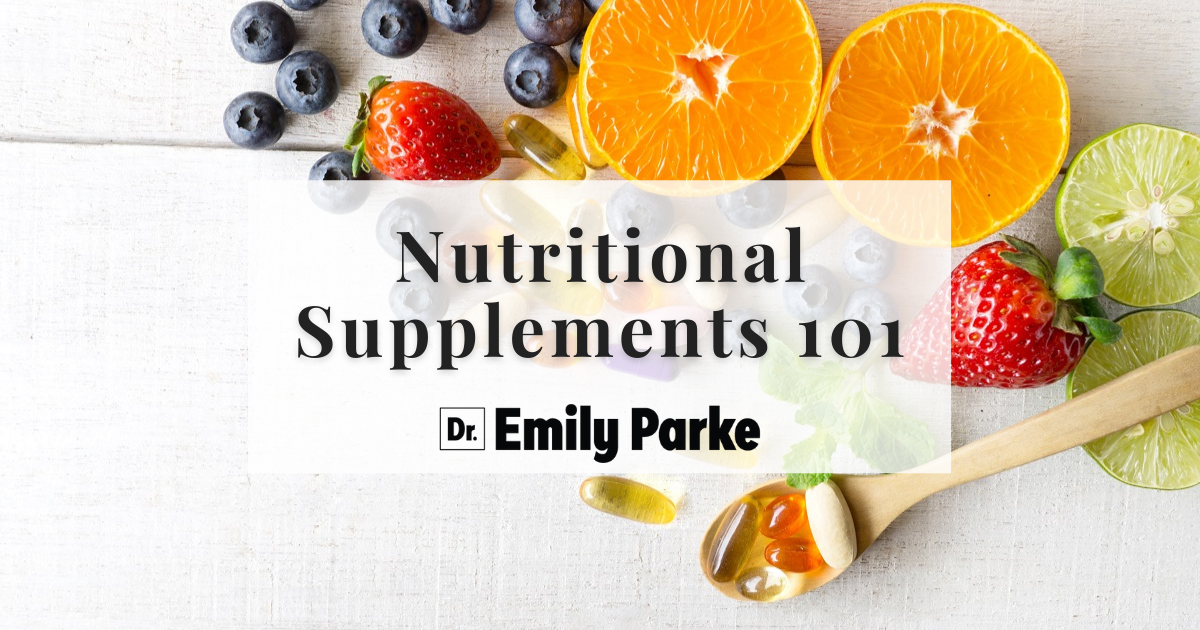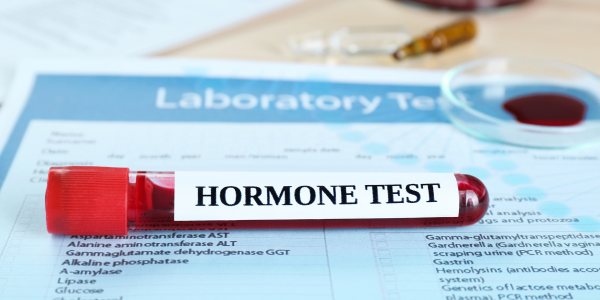

Hi. This is Dr. Emily Parke with your next Functional Health Minute. Today, I’d like to talk a little bit about basic nutritional supplements because I get asked a lot of questions like, “What supplements should I take?” Obviously, if you’re a functional medicine patient you are getting your labs checked and we know exactly what nutrient deficiencies you have. We know exactly what issues you have going on in your case and have you on very specific protocols. However, not everyone’s going to be able to make it in to see a functional medicine doctor and is not going to be able to get all the nutrients and things evaluated that we evaluate for our personal patients.
Who Needs to Take A Supplement?
Here’s the thing. If you have a really healthy diet, if you are getting eight to 10 servings of your fruits and vegetables in per day, and you’re getting three to four servings a week of cold water fatty fish, and you are eating mostly a whole foods diet, meaning not a lot of processed packaged foods, not a lot of sugars, not a lot of alcohol, not a lot of artificial sweeteners, fast foods, things like that, then you may be okay, you may not actually need nutritional supplementation or a lot of it, in any case, so just think of that.
That’s actually something I tell my patients – it is at the end of their supplement section I have a note there saying, “If you get to a point where you are eating your eight to 10 servings of plant foods a day and you’re eating a whole foods diet that does contain good protein, so meats, fishes, poultry, etc…, then you might not need a multivitamin. Same with the Omega-3 fatty acids. If you’re getting three to four servings a week of cold water fatty fish, you might not need Omega-3 fish oil.
How Do I tell If I Need to Take A Supplement?
Now, there is a laboratory test to check exactly all these things. We can check vitamin D, vitamin A, the B vitamins, all your minerals, your copper, your zinc, your selenium, your magnesium, etcetera, etcetera. We can check all these nutrients, including an Omega fatty acid check so we can see where levels are. If you haven’t been able to get to a functional medicine doctor, and you don’t have the best diet, and you’re not feeling the best, a very easy place to start is with a good high quality multivitamin, an Omega-3 fish oil, and a multi-strain probiotic. Those are three easy things to get started on.
I would do those things first and just see how you feel. I would try what I call “the one bottle trial.” See how you actually feel at the end of the month of starting the supplementation. If you do feel better and you feel like things are working great, those are things that you’ll be able to continue on. Now, in an ideal world you would get labs checked and you would see where levels are because there’s always an optimal. We don’t want levels to be too low but we also don’t want levels to be too high, we do want an optimal range for most nutrients.
A good, high quality multi-vitamin, like I said, that has the activated forms of the B vitamins in it. It’s going to have the activated forms of the minerals in it, it’s going to have smaller doses of your fat soluble vitamins like vitamin D, vitamin A, vitamin E, vitamin K, and some other key nutrients in it as well. Then an Omega-3 fish oil. Like I said, if you’re not getting your three to four servings of cold water fatty fish in per week, your Omega-3 fatty acid level might not be great and this is an easy way to start.
Omega-3’s, think of it, what do they do for your health? You think of immune system support, anti-inflammation, brain health, those are three big areas. Omega fats do get incorporated into every single cell membrane so it is an important one. Then, of course, the multi-strain probiotic, and this one happens to have Lactobacillus, Bifidobacteria, and Saccharomyces boulardii in it so it has multiple strains. You can see there’s all the strains on the back. More of a traditional type of a probiotic plus the Saccharomyces boulardii. Something like this tends to go well for most people…most people.
The 411 On Probiotics
If you have something called SIBO, small intestinal bacterial overgrowth, you may find you might not do well with a traditional probiotic. That’s because there’s bacteria that are overgrown in there and a traditional probiotic can actually exacerbate things for some patients with SIBO. Not everyone though. Some patients with SIBO can do just fine on a traditional probiotic so that would be my only caveat there.
When it comes to probiotics, if you’re eating a good amount of fermented foods in your diet, things like sauerkraut, kimchi, kefir, kombucha, etc…, do you need to take a probiotic? Probably not because you’re getting it naturally in your diet. My advice is always to have the best diet that you possibly can so that you don’t need a ton of nutritional supplements. My goal with my patients is always to get them on the least amount of nutritional supplements that we prove that they need for their health. This is Dr. Emily Parke with your Functional Health Minute.
Share:
Dr. Emily Parke
Social Media
Most Popular Posts
Subscribe To Our Newsletter
Related Posts

New Podcast Episode: My journey into functional medicine + what I’ve learned
I’m excited to share that I recently joined DeLo for Episode 165 of the On the DeLo podcast! In this conversation, we explored my journey

Understanding the Essential Labs for Women on Hormone Replacement Therapy (HRT)
So what are the minimum labs we’re looking at when we do hormone replacement therapy? We obviously want to look at an estrogen level, so

How to figure out the right amount of HRT in women
What about checking lab values when you’re on hormone replacement therapy? I do find it to be helpful, but we also want to consider symptoms.

Did you know there’s a difference between food allergies, sensitivities, and intolerances?
Did you know that there’s a difference between food allergies, food sensitivities and food intolerances? Food allergies, the reactions tend to happen pretty immediately and
